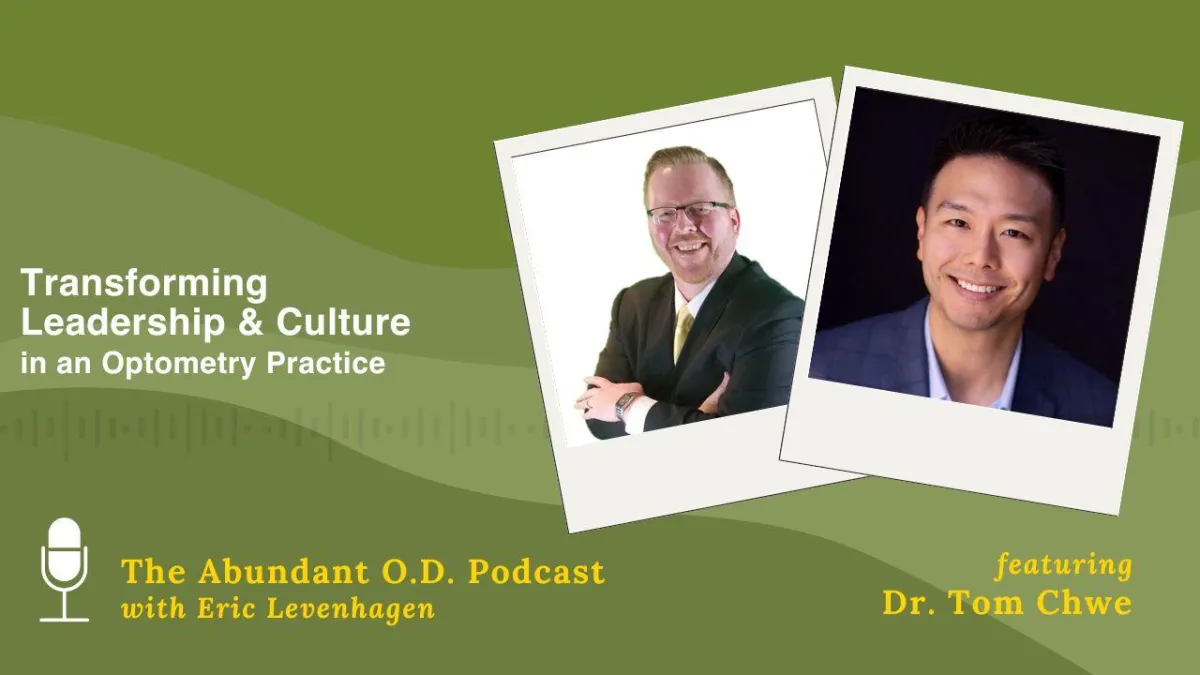
How to Create a Happier and More Productive Optometry Practice
How to Create a Happier and More Productive Optometry Practice
What's the secret to a successful optometry practice? While the latest technology and top-notch clinical skills are essential, there's a powerful, often overlooked factor that can make or break your business: workplace culture.
Dr. Tom Chwe, an optometrist with over 14 years of experience and a leadership expert, discovered this firsthand during the pandemic. When he was assigned to a single location full-time, he saw an opportunity to shape the culture of his team. The results were astounding: low turnover, high morale, and top-tier patient reviews.
His unique leadership approach, which some of his colleagues initially called "crazy" and "too nice," is rooted in a fundamental belief: treating people well and advocating for others. Having been bullied as a child, Dr. Chwe is passionate about creating a positive work environment where kindness and respect are the norm.
Key Takeaways
Mindset is Everything: Leadership isn't just a set of steps; it's a change in behavior and mindset. A leader's perspective on their team and themselves directly influences their actions.
The High Cost of Turnover: High employee turnover is a significant, hidden expense. The costs of recruiting, training, and lost productivity can be substantial, often equaling half of the employee's salary.
Don't Aim for Zero Turnover: While low turnover is a sign of a healthy practice, aiming for zero can be counterproductive. It's sometimes necessary to let go of toxic employees to maintain a positive and ethical culture.
Kindness is Not Weakness: Don't confuse being nice with being kind. Kindness is a strength that shows compassion and understanding, while still maintaining authority.
The Trickle-Down Effect: The tone of an organization starts at the top. The way a leader treats their employees is how those employees will, in turn, treat patients. This effect extends to how leaders treat themselves. If you are hard on yourself, you are more likely to be hard on others by default.
Interview Highlights
On the importance of workplace culture in optometry:
"Back in the '80s and '90s, reimbursements were pretty good... Today, it looks a little bit different because the cost of living is higher, reimbursements aren't keeping up... we have these external factors that are causing more pressure in the workplaces."
On the resistance to positive leadership:
"A lot of people find there is a lot of resistance to positive leadership for a number of reasons... When you think of positivity and kindness and compassion, it really doesn't convey authority. People assume that you would be taken advantage of... I'm looking to change that perception."
On the value of personality assessments:
"Some people prefer to hide behind a screen... Some people prefer to be people-facing... I'm a big fan of implementing a personality assessment in the practice and just getting familiar with how people respond best, what their strengths are, what tasks give them joy... I think that's so powerful."
On the difference between "nice" and "kind":
"Kindness is what I usually promote... When you think of the word nice, it has that connotation of 'I'm just saying yes to everything'... Kindness is the word that I like to use most often. We live in a society where being kind or being nice in general is not viewed in a positive light, but it doesn't work that way. People have to realize that while that's life outside of business, inside the business, it's of paramount importance."
On the power of repetition and perspective-taking:
"It's repetition. Do you ever... compare it to the experience of being on autopilot? You were supposed to stop by the grocery store... but you accidentally just came home because your mind was on autopilot... It's repetition over and over and over again until it becomes autopilot."
"I told them that we shouldn't be so quick to celebrate cancellations and no-shows... We don't know what's happening or what's going on in their lives... We should be mindful of that. So instead of saying 'Yes,' we should tell ourselves, 'I really hope they're okay.'"
Want to Watch the Full Interview?
Want to See Your Own Numbers?
Whether you run a medical practice, a growing local business, or a family-owned shop, these three metrics are the foundation of lasting profitability.
Curious where your practice stands — and how much hidden cash you could unlock?
Let’s find out together.
👉 View the On-Demand Webinar »
Get access to the online training that goes over the six financial ratios to build a more profitable practice.
👉 Book a complimentary Hidden Cash Map™ Session:
I’ll run your numbers, compare them to targets, and show you exactly where to focus first.
